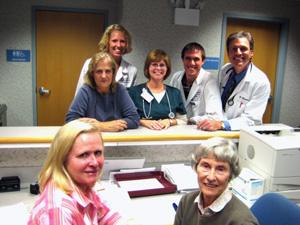
By Barb Arland-Fye
NEWTON — On Thursday nights, people who are sick but lack health care coverage visit the Jasper County Free Clinic where volunteers from the health care profession tend to their basic needs.
The Jasper County Free Clinic is one of six that serves people within the borders of the Davenport Diocese and one of about 800 clinics operating in 47 states nationwide, according to the Free Clinics of Iowa Web site. These nonprofit free clinics exist to provide primary health care services without charge to individuals who have no means to pay for the services.
Dr. Paul Ruggle, a primary care physician and member of Sacred Heart Parish in Newton, is medical director at the Jasper County Free Clinic. His wife, Dianne, is the clinic manager. Nearly 50 volunteers serve at the clinic on a rotating basis: seven physicians, three nurse practitioners, 17 nursing staff, 17 clerical/reception staff and three social service workers.
“We guarantee we’ll see 10 patients. But often times we see more than that,” says Dianne Ruggle of the weekly free clinic that opened July 5, 2007. Skiff Medical Clinic in Newton donates space for it. The genesis of the free clinic was a presentation that a representative of Free Clinics of Iowa made at a medical staff meeting Dr. Ruggle attended. After talking it over, the Ruggles decided to work with Free Clinics of Iowa to open a clinic in Newton. At the time, their community had been especially hard hit by job losses.
“We sent out a letter to ask for volunteer doctors and nurses and clerical people and had a really good response,” Dianne Ruggle said.
From 5:30-7 p.m. Thursdays, the volunteers see people with upper respiratory infections, eye infections, diabetics who need a prescription refilled, and individuals with high blood pressure or depression, for example. Services also include illness/minor injury care, social services, employment physicals, patient assistance enrollment, chronic disease management, blood glucose and high blood pressure testing.
“We are there for people who are uninsured and underinsured,” she added. “I always ask them if they have health insurance and they almost always say no. I take them at their word. It seems like we see mostly young adults, people who perhaps have jobs but don’t have health insurance.”
“There’s a large population of people who have lost their jobs, through no fault of their own, and they’re without insurance and we’re helping them the best we can,” Dr. Ruggle said.
Without the insurance paperwork he typically deals with in his primary care practice, he has more time for what matters: “It’s you and patient.” He grew up believing he had an obligation to serve others. “I see many other Catholics and non-Catholics doing the same thing.”
Dr. Patrick Edwards, a member of Sacred Heart Parish who volunteers at the free clinic about three or four times a year, echoes Dr. Ruggle. “It’s what we’re called to do. I thank Dr. Ruggle for making the opportunity available for us.”
Something Dr. Edwards didn’t expect to see at the free clinic was healthy, financially strapped people coming in for work physicals before starting a new job.
“Someone will come in and say, ‘I can have a job, but I don’t have the $100 to get a work physical.’” By providing that service, “I’m saving that person maybe $100 he doesn’t have. So I’m making life easier for him.”
And the doctor volunteers make life easier for one another, often coming in outside of their rotation to help with the demands of seeing a dozen patients in 1-1/2 hours, Dr. Edwards said.
The clinic also sees people who are chronically underserved and in poor health. In addition to the doctors and nurses who treat them, the clinic has social service workers who help them access the additional care they need, he noted.
“In our office one of the heroes is the social service worker. They dig deep to come up with other services,” Dr. Ruggle said. “They’re the hidden heroes of all this.”
Because no one is paid at the clinic, expenses are mainly for office supplies and patients’ lab tests, x-rays and any other tests needed.
“The majority of our money comes from a federal grant,” Dianne Ruggle said. “We get a couple of thousand dollars a year. We put out a basket for patient donations. Sometimes we get a few dollars, and sometimes we don’t. People are appreciative for the most part. You feel like you’re doing somebody good who otherwise might be in pain.”
And the clinic will continue, she said, “until something changes and health care is available for everybody.”
Free Clinics of Iowa current member clinics located within the Davenport Diocese: Gateway Free Clinic, Clinton; Grinnell Regional Clinic, Grinnell; Good Samaritan Free Clinic, Knoxville; Jasper County Free Clinic, Newton; Oskaloosa Free Clinic, Oskaloosa; and Good Samaritan Free Clinic, Pella.








